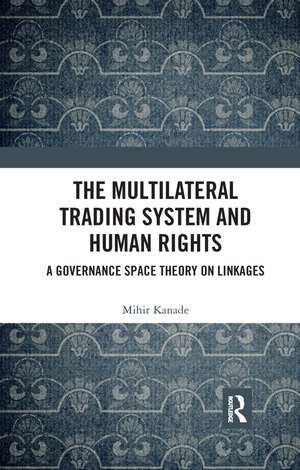The Multilateral Trading System and Human Rights: A Governance Space Theory on Linkages
Autor Mihir Kanadeen Limba Engleză Paperback – 21 mai 2019
Presenting new legal analyses informed by current debates drawn from international organisations – the World Trade Organization, United Nations, International Labour Organization – governments, civil society and academia as well as global commitments such as the Sustainable Development Goals, the book proposes a systematic and holistic policy intervention.
This timely and transdisciplinary text will be of great interest to academics, students and scholars of human rights, international trade, international law, development studies, public policy and governance, economics, politics and international relations. It will also be useful to policymakers, think-tanks, human rights advocates, professionals, lawyers, civil society organisations, non-governmental organisations and trade experts.
| Toate formatele și edițiile | Preț | Express |
|---|---|---|
| Paperback (1) | 261.95 lei 43-57 zile | |
| Taylor & Francis – 21 mai 2019 | 261.95 lei 43-57 zile | |
| Hardback (1) | 1000.27 lei 43-57 zile | |
| Taylor & Francis – 19 sep 2017 | 1000.27 lei 43-57 zile |
Preț: 261.95 lei
Preț vechi: 312.44 lei
-16% Nou
Puncte Express: 393
Preț estimativ în valută:
50.12€ • 52.47$ • 41.47£
50.12€ • 52.47$ • 41.47£
Carte tipărită la comandă
Livrare economică 07-21 aprilie
Preluare comenzi: 021 569.72.76
Specificații
ISBN-13: 9780367345396
ISBN-10: 0367345390
Pagini: 294
Ilustrații: 4
Dimensiuni: 138 x 216 x 20 mm
Greutate: 0.55 kg
Ediția:1
Editura: Taylor & Francis
Colecția Routledge India
Locul publicării:Oxford, United Kingdom
ISBN-10: 0367345390
Pagini: 294
Ilustrații: 4
Dimensiuni: 138 x 216 x 20 mm
Greutate: 0.55 kg
Ediția:1
Editura: Taylor & Francis
Colecția Routledge India
Locul publicării:Oxford, United Kingdom
Public țintă
PostgraduateCuprins
Acknowledgments. List of Abbreviations. Introduction 1. A ‘Governance Space’ Theory for Analysing Linkages 2. The Normative Hierarchy Debate and its Distractions 3. The Disputed Role of the Dispute Settlement Body 4. WTO and the Shrinking of Governance Space 5. WTO and the Permissive Environment to Abuse Governance Space 6. WTO and the Limiting Environment to Use Governance Space 7. The Way Forward: The Right to Development Approach 8. Conclusion. Appendix: List of Cases. Bibliography
Notă biografică
Mihir Kanade is Head of the Department of International Law and Human Rights at the United Nations–mandated University for Peace (UPEACE), headquartered in Costa Rica, and Director of the UPEACE Human Rights Centre. He holds an LLB from Nagpur University, India, and master’s and doctorate degrees from UPEACE. He is an adjunct faculty at Universidad Alfonso X El Sabio, Spain; Cheikh Anta Diop University, Senegal; and Long Island University, USA. He serves on the International Advisory Board of the International Bar Association on the topic of Business and Human Rights. He also coleads an educational project with the UN Office of the High Commissioner for Human Rights on promoting the right to development. Prior to his pursuit in academia, he practised as a lawyer at the Bombay High Court and the Supreme Court of India.
Recenzii
‘The Governance Space theory is a significant contribution to the complex study of trade, globalisation and human rights.’
Juan Carlos Sainz-Borgo, Dean, United Nations-mandated University for Peace (UPEACE), Costa Rica
‘A compelling case for a right to development approach to WTO and human rights linkages.’
Makau Mutua, SUNY Distinguished Professor, University at Buffalo School of Law, New York, USA
Juan Carlos Sainz-Borgo, Dean, United Nations-mandated University for Peace (UPEACE), Costa Rica
‘A compelling case for a right to development approach to WTO and human rights linkages.’
Makau Mutua, SUNY Distinguished Professor, University at Buffalo School of Law, New York, USA
Descriere
This book contributes an original theory to understanding human rights and international trade. It offers the ‘governance space’ framework for analyzing the linkages and normative relationships between the multilateral trading system and human rights regimes, and examines the ‘right to development’ approach to resolve tensions between them.
